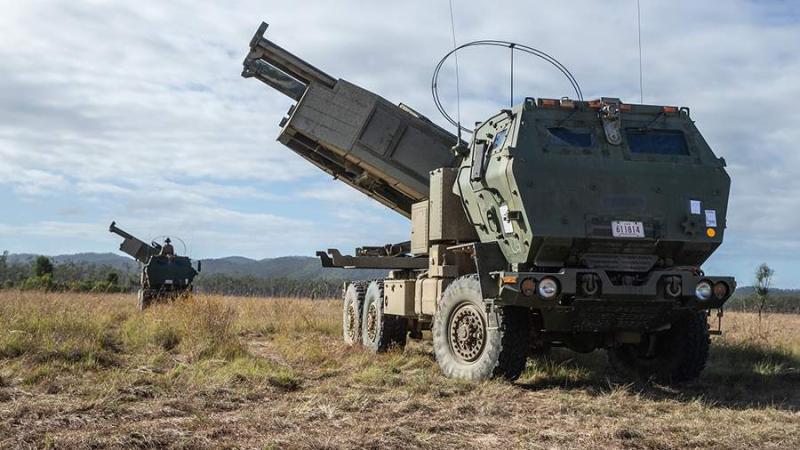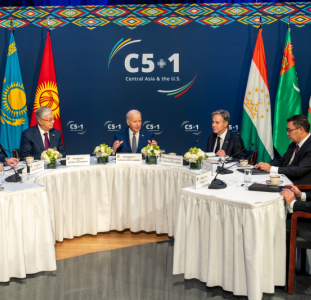
© flickr.com
Last Tuesday, The New York Times featured a major policy article by US President Joe Biden headed What America Will and Will Not Do in Ukraine, which outlines priorities of America’s Ukraine strategy. The article also touches upon relations between the United States and Russia as the world’s two leading nuclear powers. Pledging continued assistance to Kiev, the head of the White House said Washington did neither seek war with Russia nor see indication of its intent to use nuclear weapons in Ukraine. The US President made it clear he would not bow to pressure of his challengers urging more radical steps as regards the Ukrainian issue despite fears of aggravating relations with Moscow.
At the same time, President Biden said America's primary objective is "to see a democratic, independent, sovereign and prosperous Ukraine with the means to deter and defend itself against further aggression." Aggression on the part of Russia, following Washington's early statements. For this reason, Biden pledged continued supplies of advanced weaponry to Ukraine, “including Javelin anti-tank missiles, Stinger antiaircraft missiles, powerful artillery and precision rocket systems, radars, unmanned aerial vehicles, Mi-17 helicopters and ammunition."
Additionally, within the new (11th in a row) $700 million military aid package to Kiev the United States is going to provide them with long-range HIMARS (High Mobility Artillery Rocket Systems). This will advance the Ukrainian troops’ battle efficiency, not least because America's allies will get a signal to slam up military assistance to Ukraine by supplying cutting-edge weaponry, including heavy firepower equipment.
Notably, US HIMARS supplies to the Kiev regime will turn up the heat in the conflict zone, as the system is capable of launching operational and tactical missiles and hitting targets at a range of up to 300 km. Which means they may reach major cities of Russia’s southern part (like Belgorod, Bryansk, Voronezh, Kursk, Oryol), although Washington denies such a possibility. And what about people living in Simferopol, with the United States refusing to recognize Crimea as Russian?
Interestingly, Russian Deputy Foreign Minister Sergei Ryabkov said in this regard that US supplies of advanced arms to Kiev, despite any arguments by Washington, raise up the risk of a direct confrontation between Washington and Moscow. In turn, the country's Foreign Minister Sergei Lavrov warned on Wednesday of the danger that third countries get drawn into the conflict if Kiev eventually gets MLRS from the West. And Russian president’s Press Secretary Dmitry Peskov assured: Russia is taking a full range of comprehensive measures to minimize the risks in case of such a delivery. Yet he scorned to explain what kind of retaliation would follow if American missiles targeted the territory of Russia. "Let's avoid discussing such scenarios," the Kremlin spokesman said.
The situation was somewhat clarified by Deputy Chairman of the Russian Security Council Dmitry Medvedev, who earlier wrote the following in his Telegram channel: "If our cities come under attack, the Russian Armed Forces would fulfill their threat and strike centers making criminal decisions to this effect. Some of them are not in Kiev. There's no need to explain what's next."
While the US military takes a pretty restrained position over a further escalation in Ukraine, Washington’s political establishment, including hardcore Democrats, is apt to more resolute actions. Sentiments of President Biden's opponents, disappointed with timid ˗ as they see it ˗ support to Ukraine, were stated the other day by former US Ambassador to Moscow Michael McFaul, who urged US President to send MLRS to Ukraine at the earliest moment.
"The system is well-constructed. Biden is being bent from inside by a group of Democratic Party neocons via Kiev clowns," Russian Foreign Ministry spokeswoman Maria Zakharova commented upon Washington’s ongoing disputes over American military assistance to Kiev in her Telegram channel on June 2nd. She reminded of a recent statement by Ukrainian presidential adviser Oleksiy Arestovich that Ukraine would have tantrums if the Biden administration did not provide it with MLRS. Mr. Arestovich's hysteria apparently persuaded Washington to nail down HIMARS supplies.
Still, there is a group of heavyweight organizations and politicians in the United States outraged by the Biden administration’s zeal to arm and finance Ukraine. One of them is the Heritage Foundation, a major conservative think tank ideologizing the Republican Party on the Ukrainian issue. Earlier on, Heritage experts used to be always hawks and criticized the same Barack Obama for way too much uncertainty about using military force, but now they are dead set against, say, allocating aid to Ukraine, let alone stepped-up engagement in the conflict.
This stance basically refutes that of Senate Republican Leader Mitch McConnell about a "tiny minority" of those opposing the current US Ukraine course. Yes, the Heritage leadership opposes Russia’s special operation and is ready to support the "brave Ukrainian people", though preferably on a moral level alone and certainly without compromising the American economy. As you can see, the fund is still true to ex-president Donald Trump’s America First mantra. Let’s make it clear that foundations denouncing military assistance to Ukraine are not that many in the United States.
One final comment: by pumping weaponry into Ukraine, the Biden administration is replicating the Cuban missile crisis of October 1962, which nearly wrapped up the entire history of mankind. This year marks its 60th anniversary, by the way. The longer the military-political drama around Ukraine continues, the more common features these conflicts have. Then US President John F. Kennedy had the will and common sense to prevent a global catastrophe.
Unfortunately, there is hardly anyone like Kennedy among Ukraine’s or America’s current leadership, and their ill-considered moves may entail a nuclear World War fraught with dire consequences for all of humanity. Do Washington and Kiev realize that they dance with the devil when settling for an aggravation with Russia? Less than fully, by the looks of it…









